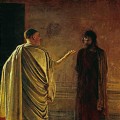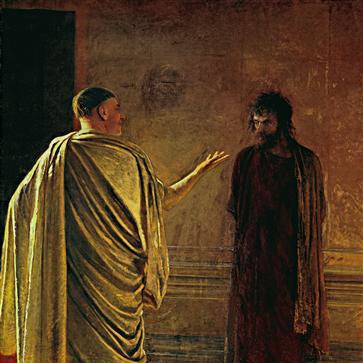First, we ought not disregard the historical value of the New Testament. Within the New Testament we have at least eight independent authors confirming the outline of the life of Jesus. However, there are also many sources that tell us about the life of Jesus of Nazareth and the beliefs of his followers that do not come from Biblical sources.
Jesus as a historical figure
1) Tacitus: first century roman historian,
To get rid of the report, Nero fastened the guilt and inflicted the most exquisite tortures of a class hated for their abominations, called Christians by the populace. Christus, from whom the name had its origin, suffered the extreme penalty during the reign of Tiberius at the hands of one our procurators, Pontius Pilatus, and a most mischievous superstition, thus checked for the moment, again broke out not only in Judea, the first source of the evil, but even in Rome, where all things hideous and shameful from every part of the world find their center and become popular.
2) Suetonius: chief secretary to Emperor Hadrian
Because the Jews at Rome caused continuous disturbances at the instigation Chrestus, he expelled them from the city. After the great fire at Rome… Punishments were also inflicted on the Christians, a sect professing a new and mischievous religious belief.
3) Flavius Josephus: a Jewish revolutionary who transferred his allegiance to Rome to save his life
At this time there was a wise man named Jesus. His conduct was good and [He] was known to be virtuous. And many people from among the Jews and the other nations became his disciples. Pilate condemned him to be crucified and to die. But those who became his disciples did not abandon his discipleship. They reported that he appeared to them three days after his crucifixion, and that he was alive; accordingly he was perhaps the Messiah, concerning whom the prophets have recounted wonders.
He [Ananias] convened a meeting of the Sanhedrin and brought before them a man named James, the brother of Jesus, who was called the Christ, and certain others. He accused them of having transgressed the law and delivered them up to be stoned.
4) Thallus: In 221 A.D. Julius Africanus quotes an historian named Thallus concerning the darkness recounted by Luke 23:44-45
On the whole world there pressed a most fearful darkness; and the rocks were rent by an earthquake, and many places in Judea and other districts were thrown down. This darkness Thallus, in the third book of his History calls, as appears to me without reason an eclipse of the sun.
5) Pliny the Younger: a Roman administrator, wrote a letter to Emperor Trajan describing Christian worship in 112 A.D.
They were in the habit of meeting on a certain fixed day before it was light, when they sang an anthem to Christ as God, and bound themselves by a solemn oath, not to commit any wicked deeds, but to abstain from all fraud, theft or adultery, never to break their word, or deny a trust when called upon to honor it; after which it was their custom to separate, and then meet again to partake of food, but food of an ordinary innocent kind.
6) Emperor Trajan: wrote in response to Pliny
No search should be made for these people; when they are denounced and found guilty they must be punished; with this restriction, however, that when the party denies himself to be a Christian, and shall give proof that he is not (that is, by adoring our gods) he shall be pardoned on the ground of repentance, even though he may have formerly incurred suspicion.
7) Hadrian: Eusebius, an early Christian historian, recorded a letter from Emperor Hadrian
I do not wish, therefore, that the matter should be passed by without examination, so that these men may neither be harassed, nor opportunity of malicious proceedings be offered to informers. If, therefore the provincials can clearly evince their charges against the Christians, so as to answer before the tribunal, let them pursue this course only, but not by mere petitions, and mere outcries against the Christians. For it is far more proper, if anyone would bring an accusation, that you should examine it.
8) Lucian: a second century Greek author who wrote against Christianity
The Christians, you know, worship a man to this day, the distinguished personage who introduced their novel rites, and was crucified on that account. You see, these misguided creatures start with the general conviction that they are immortal for all time, which explains the contempt of death and voluntary self-devotion which are so common among them; and then it was impressed on them by their original lawgiver that they are all brothers, from the moment that they are converted, and deny the gods of Greece, and worship the crucified sage, and live after his laws. All this they take quite on faith, with the result that they despise all worldly goods alike, regarding them merely as common property.
9) Mara bar-Serapion: a Syrian writing to his son
What advantage did the Athenians gain from putting Socrates to death? Famine and plague came upon them as judgment for their crime. What advantage did the men of Samon gain from burning Pythagoras? In a moment their land was covered with sand. What advantage did the Jews gain from executing their wise king? It was just after that their kingdom was abolished. God justly avenged these three wise men: the Athenians died of hunger; the Samians were overwhelmed by the sea; the Jews, ruined and driven from their land, live in complete dispersion. But Socrates did not die for good; he lived on in the statue of Hera. Nor did the wise king die for good; he lived on in the teaching he had given.
10) The Talmud: writings of the Talmud talk about Jesus, for example:
On the eve of Passover Yeshua was hanged. For forty days before the execution took place, a herald went forth and cried, he is going forth to be stoned because he has practiced sorcery and enticed Israel to apostasy. Anyone who can say anything in his favour, let him come forward and plead on his behalf. But since nothing was brought forward in his favour he was hanged on the eve of the Passover!
Summary
In summary, from non biblical sources we know that:
- Jesus was a Nazarene
- He was crucified during the reign of Tiberius under Pontius Pilate for claiming to be the king of the Jews
- Early Christians believed that he was raised three days after his death
- His enemies recognized he performed miraculous signs that they deemed Sorcery
- His followers grew quickly, even reaching Rome
- His disciples rejected polytheism, lived moral lives, and worshiped Jesus as God
Further Reading
Basic Theology, Charls C. Ryrie, p. 108-109
Systematic Theology, Wayne Grudem, p. 60-69
Handbook of Christian Apologetics, Peter Kreeft, p. 199-221
The Historical Reliability of the Gospels, Craig Blomberg





